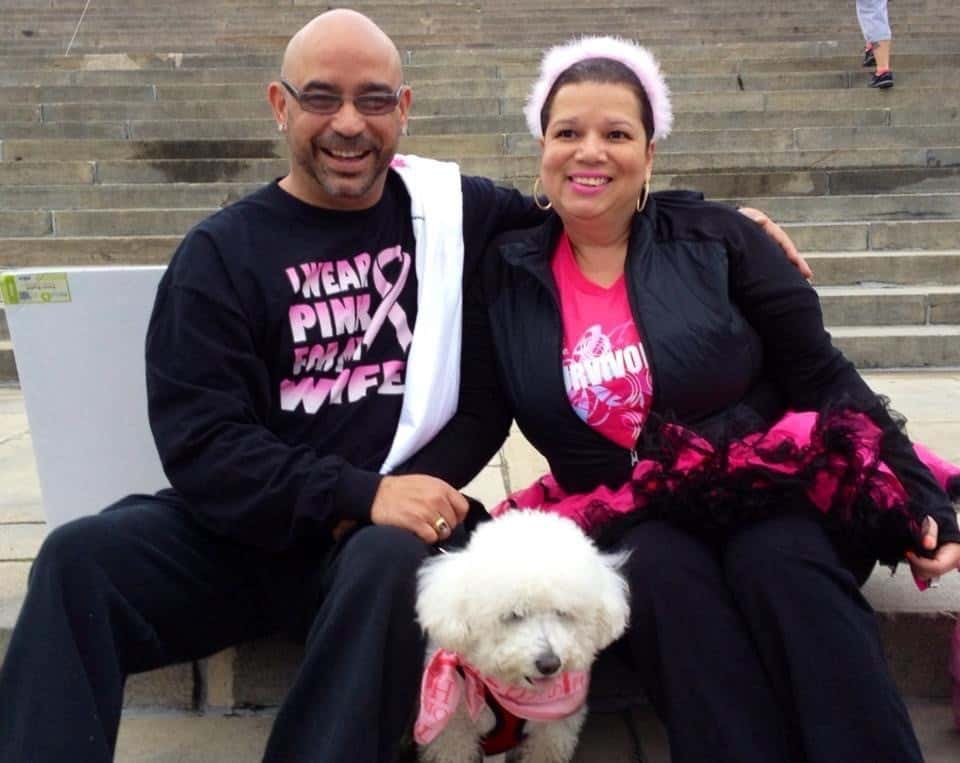
In 2010, when Iris Lopez-Mendez felt a lump in her right breast, she reached out to her doctor. She had a mammogram followed by a biopsy, which confirmed she had stage 2A breast cancer. She had a lumpectomy, radiation and chemotherapy.
“I thought that once I finished treatment, my breast cancer journey was over,” Iris said. “Every year, I’d celebrate with my friends and my family. One year, two years, three years. The further away I got from treatment, the more we celebrated,” she said.
Life went on. Iris had bloodwork and yearly mammograms. She retired in 2018 and she and her husband, Rey, adopted her niece. The family traveled often, to Aruba, Mexico, Jamaica, Puerto Rico. “Life was good,” she said. “We’re traveling, we’re spending time with our family. I really had no complaints.”
Even the unexplained pain Iris started experiencing wasn’t really worth complaining about, though as the years passed, the pain ramped up. In 2022, the pain seemed to center in her hips, making it sometimes difficult to walk. “An X-ray found fluid on my hips,” Iris said. “We thought that was causing my pain.”
But in 2023, the pain had intensified so much that Iris ended up in the emergency room three times. “I wasn’t really the kind of person to go into the ER, but I knew something was wrong,” she said. “I had an EKG, I had X-rays. But nothing showed up.” No one could really explain what caused the pain and why it had gotten worse.
Toward the end of 2023, Iris went in for her annual mammogram. While she was at her appointment, she mentioned the pain she was having to the tech, who thought it sounded like Iris’ pain might be due to kidney stones. “She told me to go to the ER, to see if they could see kidney stones,” Iris said, so after her mammogram, she walked over to the ER and explained, again, the pain she was experiencing.
“They did an X-ray and they saw the kidney stones,” Iris said. “But they also saw lesions on my liver.”
A flurry of tests followed, and the news was a blow, something Iris had never considered: she had stage 4 (metastatic) breast cancer (MBC) and it had spread to her spine, liver and bones. “I was numb. I didn’t even cry. I was in shock,” Iris recalled. “How could I have stage 4 cancer and nobody knew? I think back to all those ER visits and no one ever thought to do a bone scan, a PET scan, an MRI. Would a bone scan have found it sooner? I was doing everything I was supposed to be doing. I went to my follow up appointments. I had yearly mammograms. I felt that this was somehow my fault.”
After her biopsy and MBC diagnosis, Iris asked her doctor these questions. “Maybe it was a piece of the cancer that didn’t go away even after the chemo and radiation. I thought my mammograms would show anything that was wrong. But they didn’t show this.”
Iris’ treatment includes systemic therapy, the goal of which is to get rid of cancer cells that may have spread from the breast to other parts of the body. “There’s no cure for metastatic breast cancer,” Iris said. “They’re doing maintenance to prolong my life and keep me comfortable.” She receives a monthly injection and has blood work and a heart check every 2-3 weeks.
Iris hopes other women will be empowered to speak up and advocate for themselves. “I didn’t know pain could be related to MBC. I should have pushed for more testing, especially since the pain continued for so long,” she said. “I hope my story encourages other women to advocate themselves, to push for a bone scan or MRI when something doesn’t seem right.”
She’s had some difficult days, but Iris finds strength in her family. They give her a reason to keep going. “I’ve learned to push myself so I can live a longer life. I don’t look at this as a death sentence,” she said. “I want to get the pain in check so Rey and I can travel, so we can live our lives.”
Learn more about metastatic breast cancer.
Statements and opinions expressed are that of the individual and do not express the views or opinions of Susan G. Komen. This information is being provided for educational purposes only and is not to be construed as medical advice. Persons with breast cancer should consult their healthcare provider with specific questions or concerns about their treatment.



